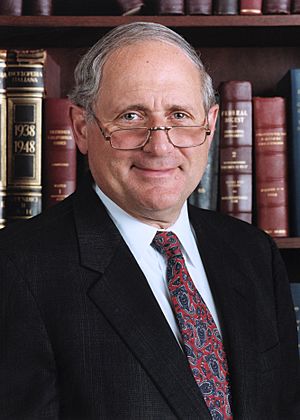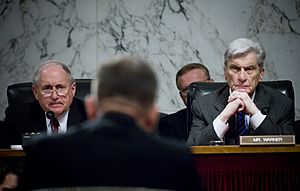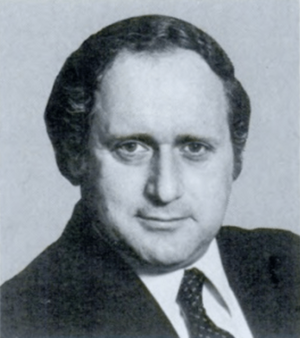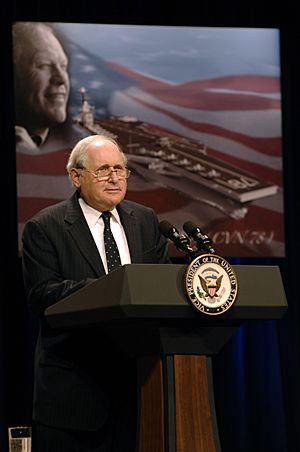Carl Levin facts for kids
Quick facts for kids
Carl Levin
|
|
|---|---|
 |
|
| United States Senator from Michigan |
|
| In office January 3, 1979 – January 3, 2015 |
|
| Preceded by | Robert Griffin |
| Succeeded by | Gary Peters |
| Chair of the Senate Armed Services Committee | |
| In office January 3, 2007 – January 3, 2015 |
|
| Preceded by | John Warner |
| Succeeded by | John McCain |
| In office June 6, 2001 – January 3, 2003 |
|
| Preceded by | John Warner |
| Succeeded by | John Warner |
| Member of the Detroit City Council | |
| In office January 7, 1969 – January 7, 1977 |
|
| Preceded by | Ed Carey |
| Succeeded by | Kenneth Cockrel Sr. |
| Personal details | |
| Born |
Carl Milton Levin
June 28, 1934 Detroit, Michigan, U.S. |
| Died | July 29, 2021 (aged 87) Detroit, Michigan, U.S. |
| Political party | Democratic |
| Spouse |
Barbara Halpern
(m. 1961) |
| Children | 3 |
| Relatives | Sander Levin (brother) Andy Levin (nephew) |
| Education | Swarthmore College (BA) Harvard University (JD) |
| Signature | |
Carl Milton Levin (June 28, 1934 – July 29, 2021) was an American lawyer and politician. He served as a U.S. Senator for Michigan from 1979 to 2015. He was a member of the Democratic Party. Carl Levin was known for leading the Senate Armed Services Committee. He held this important role from 2001 to 2003 and again from 2007 to 2015.
Born in Detroit, Carl Levin studied at Swarthmore College and Harvard Law School. Before becoming a senator, he worked for the Michigan Civil Rights Commission. He also served as a special assistant attorney general. From 1969 to 1977, Levin was a member of the Detroit City Council. For the last four of those years, he was the council's president.
In 1978, Levin ran for the U.S. Senate. He won against the Republican senator at the time, Robert P. Griffin. Carl Levin was re-elected five more times. He served for a total of 36 years. This made him the longest-serving senator in Michigan's history. He decided not to run for a seventh term in 2013. After leaving the Senate, he started the Levin Center at Wayne State University Law School. This center works to make public and private groups more honest and open.
Contents
Early Life and Education
Carl Levin was born in Detroit to Jewish parents, Bess Rachel and Saul R. Levin. His father, Saul, worked for the Michigan Corrections Commission. Carl went to Detroit Central High School. He graduated in 1952.
He then attended Swarthmore College, earning a degree in political science in 1956. During his summer breaks, he worked as a taxi driver and on an auto factory line. After college, he went to Harvard Law School. He earned his law degree in 1959. He also received honorary degrees from several universities later in his life.
After law school, Levin became a lawyer in Michigan. He worked in private law firms and taught law at Wayne State University. From 1964 to 1967, he was the main lawyer for the Michigan Civil Rights Commission. He helped create the Detroit Public Defender's Office. He also worked for the state of Michigan as a special assistant attorney general.
Serving on the Detroit City Council
Carl Levin was elected to the Detroit City Council in 1969. He served two four-year terms, from 1970 to 1977. During his second term, he was the president of the City Council. He worked closely with Detroit Mayor Coleman Young, the city's first African-American mayor. Forbes magazine called him Mayor Young's "right hand man."
While on the City Council, Levin was frustrated with how the U.S. Department of Housing and Urban Development handled empty houses in Detroit. These houses caused urban decay in neighborhoods. To show his frustration, he and other council members even used a bulldozer to help tear down some of these houses.
Carl Levin in the U.S. Senate
Carl Levin was elected to the United States Senate in 1978. He defeated the Republican Senator Robert P. Griffin. He was re-elected five times, serving until 2015.
Key Senate Committees
As a senator, Carl Levin served on several important committees:
- Committee on Armed Services: He was the chairman of this committee for many years. This committee oversees the U.S. military.
- Committee on Homeland Security and Governmental Affairs: This committee deals with government operations and national security.
- Committee on Small Business and Entrepreneurship: This committee supports small businesses.
- Select Committee on Intelligence: This committee oversees U.S. intelligence agencies.
Laws He Helped Create
Carl Levin was the main sponsor of 51 bills that became law. This means he played a key role in getting these laws passed.
His Views and Actions
Working on Armed Services

Carl Levin led the Armed Services Committee from 2001 to 2003 and again from 2007 until he retired in 2015. He joined this committee when he first became a senator. He wanted to learn more about the military.
He strongly believed in controlling costs for military purchases. He also pushed for more openness in government. He worked to make many documents public, especially those about false claims linking Iraq to al-Qaeda.
Levin believed that to improve the military, unneeded bases should be closed. He helped pass the Defense Base Realignment and Closure Act, which closed some military bases.
He supported the Nunn–Lugar Cooperative Threat Reduction Program. This program helps secure and dismantle nuclear, chemical, and biological weapons from former Soviet countries. Levin said this program offered "a chance to bury the new Hitlers and Stalins of that region before they have a chance to take root."
Levin also voted to approve important treaties like START I, START II, and New START. These treaties aimed to reduce nuclear weapons in the U.S. and Russia. He believed these treaties showed the U.S. was committed to reducing the dangers of nuclear weapons.
As chairman of the Armed Services Committee, Levin helped pass laws like the Matthew Shephard and James Byrd, Jr., Hate Crimes Prevention Act of 2009. He also helped end the "Don't Ask, Don't Tell" policy for gay people in the military in 2010.
Levin led Senate investigations into how detainees were treated at Guantanamo Bay Naval Base and Abu Ghraib. He also played a key role in passing the Detainee Treatment Act, which banned torture of detainees in U.S. custody.
Afghanistan War
After the 9/11 terrorist attacks, Levin voted to allow President George W. Bush to use military force against those who planned the attacks.
However, he later became critical of the Bush administration's handling of the Afghanistan War. In 2005, he said they "took their eye off the ball" by focusing on Iraq instead of al-Qaeda. He was concerned that the U.S. and its allies lacked a clear plan for success in Afghanistan.
Levin was against the 2009 plan to send 30,000 more U.S. troops to Afghanistan. He stressed the importance of training and expanding the Afghan National Army and Afghan National Police. He believed Afghans should take more responsibility for their own security.
Iraq War
Carl Levin was an early opponent of using U.S. military force in Iraq. In August 2002, he said that if Saddam Hussein had weapons of mass destruction, he wouldn't use them. He wanted President Bush to build an international group with the United Nations before going to war.
Levin was one of only 23 senators who voted against the Iraq Resolution. He argued that the War in Iraq was a distraction from the War on Terror. He believed the Bush administration misled the American people about Saddam Hussein's connection to 9/11.
After Democrats gained control of the Senate in 2006, Levin became chairman of the Senate Armed Services Committee again. This gave him a strong position to challenge the Bush administration's Iraq policy. In October 2011, Levin supported President Barack Obama's decision to withdraw U.S. troops from Iraq.
National Defense Authorization Act
Levin played a key role in creating the National Defense Authorization Act for Fiscal Year 2012. This important bill funds the U.S. military each year. He worked with Senator John McCain on parts of the bill that dealt with detaining captured individuals, including terrorists.
The 2015 National Defense Authorization Act was named the Carl Levin and Howard P. "Buck" McKeon National Defense Authorization Act. This was done to honor their work. In 2016, the Department of Defense named an office suite after Levin and Senator John Warner. This honored their teamwork on laws.
Levin also wrote the Competition in Contracting Act. This law helped reduce costs for federal government purchases. He also helped pass the Federal Acquisition Streamlining Act, which cut down on paperwork for government buying.
Financial Oversight and Investigations
For 15 years, Carl Levin was a leader on the U.S. Senate Permanent Subcommittee on Investigations. This group looks into important issues. During his time, he led investigations into things like money laundering and tax abuse.
He exposed how some wealthy people and companies avoided paying taxes. He also investigated corporate misconduct. For example, he looked into Enron's accounting tricks that led to its collapse. He also investigated unfair credit card practices and risky investments by large banks.
Education and Energy
Levin strongly supported creating the Department of Education. He also introduced laws to improve education. One important change he supported was reducing class sizes. This helps teachers focus better on each child.
In 2009, Senator Levin asked for an investigation into whether Department of Energy policies caused oil prices to rise. He also led an investigation in 2001 into why gasoline prices spiked that summer.
Protecting the Environment
Carl Levin worked hard to protect Michigan's environment. He introduced a law in 2013 that made about 32,500 acres of the Sleeping Bear Dunes National Lakeshore a wilderness area. This means it is protected from development.
He also worked to stop garbage from Canada from being dumped in Michigan. As co-chairman of the Senate Great Lakes Task Force, he fought to protect the Great Lakes. He supported funding for Great Lakes environmental cleanup. He also helped create the Thunder Bay National Marine Sanctuary.
Ethics and Whistleblowers
Levin wrote the Lobbying Disclosure Act of 1995. This law made it necessary for lobbyists to report their activities. It also made rules stricter for gifts to members of Congress. He also wrote the Ethics Reform Act of 1989. This law banned certain payments to members of Congress.
He also wrote the Whistleblower Protection Act. This law protects government employees who report wasteful or wrong practices.
Health Care
Senator Levin supported a Patients' Bill of Rights. This bill aimed to reduce the power of managed care organizations over medical decisions.
He also supported embryonic stem-cell research. He believed it had the potential to cure diseases like Alzheimer's, diabetes, and Parkinson's.
Other Interesting Facts
In April 2006, Time magazine named Carl Levin one of "America's 10 Best Senators."
He was known for always wearing his glasses at the end of his nose. This often drew humorous attention. He would joke about it lightheartedly.
Levin was a strong supporter of gun control. He was also a big supporter of the non-profit civil rights group Focus: HOPE. He helped them get equipment and funding for their Machinist Training Institute.
Political Campaigns
Carl Levin was first elected to the U.S. Senate in 1978. He won the Democratic primary against former U.S. Representative Richard Vander Veen. In the main election, he beat the Republican Senator Robert P. Griffin.
He won re-election five times. In 1984, he had a tough race against former astronaut Jack R. Lousma, winning by only four percent. However, he won easily in later elections. In 2008, he won by a large margin against state representative Jack Hoogendyk.
Personal Life and Passing
Carl Levin married Barbara Halpern in 1961. They had three daughters and six grandchildren.
His family was very active in Michigan politics. His older brother, Sander Levin, was a U.S. Representative from 1983 to 2019. Carl's nephew, Andy Levin, Sander's son, was also elected to the U.S. House of Representatives in 2018. Carl's uncle, Theodore Levin, was a chief judge.
In March 2021, Carl Levin shared that he had lung cancer. He passed away at Henry Ford Hospital in Detroit on July 29, 2021, at the age of 87.
Honors and Awards
- In 2004, he received an honorary Doctor of Laws degree from Oakland University.
- In 2006, Time magazine named him one of the "10 best senators."
- In 2007, he received the Franklin and Eleanor Roosevelt Foundation's Freedom medal.
- In 2011, he received an award for his "untiring efforts on behalf of financial integrity."
- In 2014, he was awarded the National Marine Sanctuary Foundation Leadership Award.
- In 2016, the USS Carl M. Levin, an Arleigh Burke-class destroyer ship, was named in his honor. It was officially launched in 2021.
See also
 In Spanish: Carl Levin para niños
In Spanish: Carl Levin para niños
- List of Jewish members of the United States Congress
Images for kids
 | Roy Wilkins |
 | John Lewis |
 | Linda Carol Brown |




